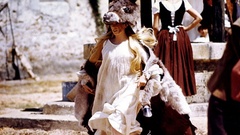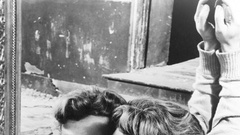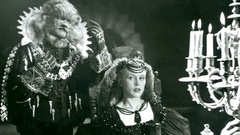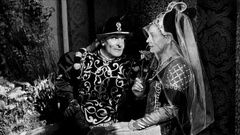Black Orpheus (1959)
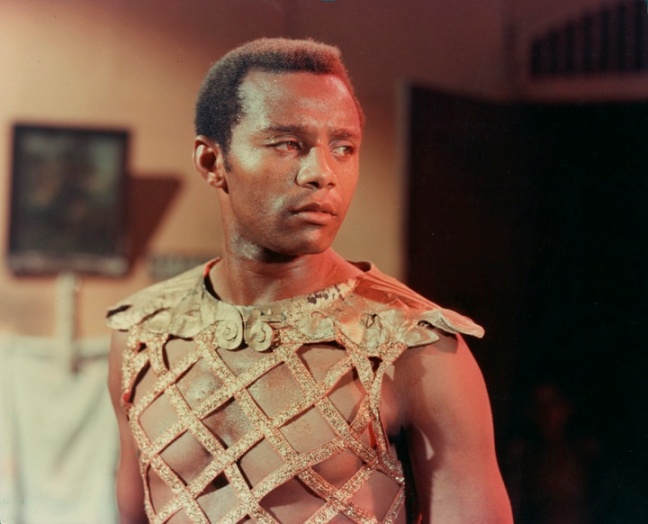
Part of the French Myths and Fairytales
| Director: | Marcel Camus |
|---|---|
| Certificate: | Unknown |
| Length: | |
| Format: | 35mm |
| Language: | Portuguese with English subtitles |
| Country: |
From a French director but set in Brazil, this is an incredible adaptation of the Greek myth of Orpheus, in the Carnival of Rio de Janeiro. Winner of the Palme D’Or (highest prize) at the Cannes Film Festival, and of the Oscar for Best Foreign Film, it features a magic soundtrack of samba and bossa nova.
THE PLOT
Rio de Janeiro, festival time. Eurydice arrives in Rio to go and visit her cousin. She is fleeing from home where a man is trying to kill her. Orfeu is a friend of her cousin: he is about to get married to the very jealous Mira, but he is not very enthusiastic about the wedding. Orfeu and Eurydice meet, and they rapidly fall in love…
ABOUT
Adaptation of the Greek Myth
The film is an adaptation of the play Orfeu da Conceição by Vinicius de Moraes, which is an adaptation of the Greek Myth of Orpheus and Eurydice. However, the film is adapting the play freely, just like the play itself was not entirely faithful to the myth.
If the Greek myth is a tragedy, the film's main tone is a happy one, where hope, excitement, music and a party-atmospehere dominate.
The Music
The music, a mix of samba and bossa-nova, is omnipresent in the film, and gives it a great rythm. The gorgeous bossa nova songs, that have become very famous, have been composed by the legendary Brazilian musician Antonio Carlos Jobim, and by Luiz Bonfa. As the film is set during the festival, a lot of scenes feature crowds dancing to samba, and it sometimes resembles a documentary on the Rio Carnival.
The Colours
The film has very strong colours, adding to the atmosphere of party and excitement. The dominating colours are yellow, red and blue. The yellow is attached to Orfeu, the blue to Eurydice, and the red to death.
Orfeu: The Sun God
In this film, Orfeu can be seen as the Sun God, who makes the sun rise by singing with his guitar. This is also reminded by his costume of the carnival, of golden colour. In this film, Orfeu is a singer, just like in the Greek Myths, in which Orpheus sings with a lyre.
 PRIZES
PRIZES
The film was a huge popular success worldwide, and won some of the most prestigious film awards:
- Winner of the Palme D’Or (Highest prize) at the Cannes Film Festival
- Winner of the Oscar for Best Foreign Language Film
- Winner of the Golden Globe for Best Foreign Film
THE DIRECTOR: FACTS ABOUT ALBERT CAMUS (1912-1982)
- During the war, Marcel Camus was held prisoner in a German military camp. It is there that he started writing and producing theatre plays, with other prisoners.
- After the War, he became a director assistant, to Bunuel or Jacques Becker (Casque D’Or)
- He made his first film in 1957 (Mort en Fraude, set in Indochina)
- Black Orpheus is his second film
- Marcel Camus made 7 films, and Black Orpheus is by far his most famous film
THE REAL STORY: THE GREEK MYTH OF ORPHEUS AND EURYDICE
The most well-known version of the myth is the one from Virgil. In that version, Eurydice and Orpheus are husband and wife. At her wedding, Eurydice walks in tall grass and gets bitten by a snake, which kills her.
Distraught, Orpheus plays gorgeous and sad songs, which soften the gods’ hearts. They agree for Orpheus to go to the underworld to get his wife back. The condition, however, is that, on their way back to the upperworld, she walks behind him and that he doesn’t look at her until both of them have reached the upper world.
They walk without looking at each other, but as soon as Orpheus has reached the upper world, anxious to see his wife, he turns round, and does not pay attention to the fact that at this time, she had not stepped out of the underworld. She then disappears, for ever.
 STRANGE FACT
STRANGE FACT
Black Orpheus is one of the favourite films of Barak Obama’s mother.
Other films in the French Myths and Fairytales:

06
Film: Donkey Skin (Peau D'Ane) (1970)
6 Jun 2010, 7:30 p.m.
Not very well known outside of France, this is an absolute gem: magical musical from Jacques Demy (The Umbrellas of Cherbourg), with international star Catherine Deneuve in gorgeous princess dresses, and with golden donkeys, blue horses and a benevolent fairy. Adaptation of a 17th century tale about a princess fleeing from her father King.

10
Film: Orphee (1950)
10 Jun 2010, 7:30 p.m.
Poet, playwright, artist and filmmaker, Jean Cocteau was one of the most significant artists of the 20th century, and Orphee is one of his finest films. This magical retelling of the Orpheus myth turns the singer of Greek legend, into a famous left-bank poet in post-war Paris. With famous mirror dissolving and flying tricks, this is hauntingly beautiful.

13
Film: The Beauty And The Beast (La Belle Et La Bete) (1946)
13 Jun 2010, 7:30 p.m.
“One of the most spellbinding fairy tales in all cinema” (The Times), this is a landmark feat of cinematic fantasy, in which master filmmaker Jean Cocteau conjures spectacular visions of enchantment, desire and death that have never been equalled. Incredible designs, fascinating Beast, beautiful B&W photography - captivating and unforgettable.

17
Film: The Devil's Envoys (Les Visiteurs Du Soir) (1942)
17 Jun 2010, 7:30 p.m.
Directed by M. Carné and written by the incredible French poet J. Prévert – the same duo who made the legendary film Les Enfants du Paradis. Written during the war, they chose to set the film in the 15th century so that they are not affected by censorship. 2 envoys of the devil are sent to earth.


